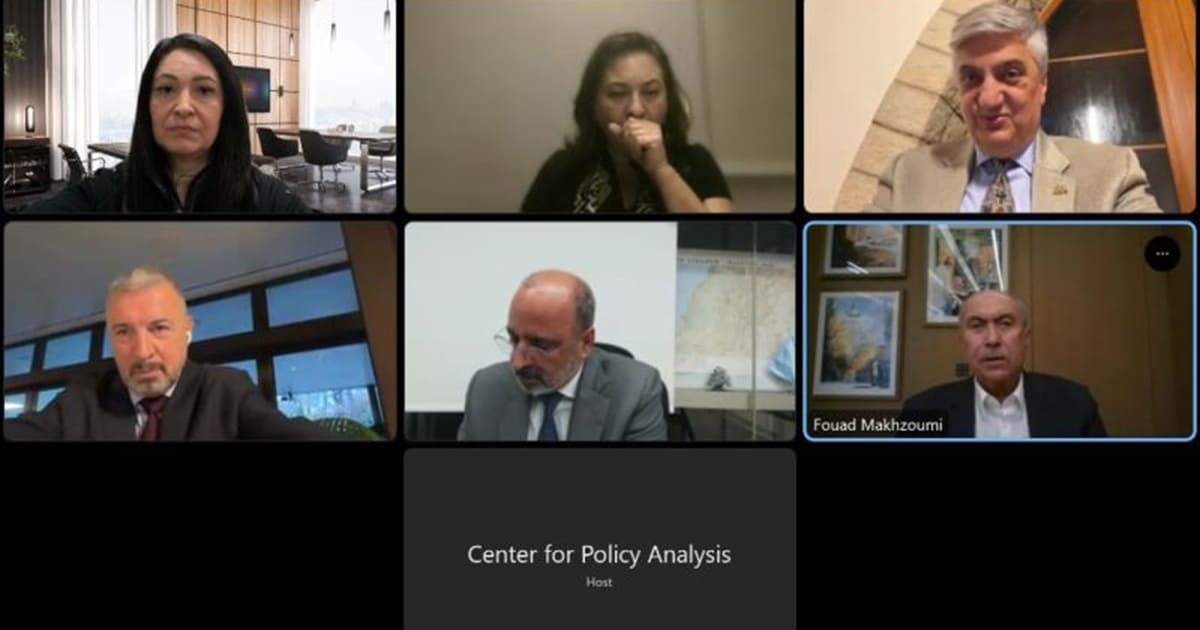Hezbollah-Israel War: The Day After
A panel hosted by the Center for Policy Analysis expands on the steps needed to help the country reform, recover and rebuild.
Past conflicts and events in Lebanon have raised many questions about the mismanagement of foreign aid, accountability and transparency. As the country faces yet another reconstruction and recovery phase, proactive planning is paramount.
To that end, a panel by the Center for Policy Analysis (CePA) at LAU explored the importance of preventative measures and structured public policies to avoid the mishandling of aid. Titled Hezbollah-Israel War The Day After: Public Policy Frameworks to Safeguard Foreign Aid in Reconstruction, the online discussion, held on November 21, featured key stakeholders, namely Lebanese Member of Parliament and longtime friend and supporter of the university Fouad Makhzoumi, World Bank Country Director for Mashreq Jean-Christophe Carret and UN Special Coordinator for Lebanon Imran Riza.
The session was moderated by the President of the Institut des Finances Basil Fuleihan Lamia Moubayed, who is also the vice chair of the UN Committee of Experts on Public Administration Introduction.
LAU Assistant to the President for Public Policy and CePA Director Leila Dagher welcomed the large number of attendees, underlining the timeliness of the topic and affirming the center’s commitment to tackle nationwide issues.
In his introductory remarks, LAU President Chaouki T. Abdallah stressed the important role of the university in addressing Lebanon’s challenges toward building a culture of accountability, transparency and integrity, while educating and shaping a new generation of Lebanese community leaders. “By discussing the day after,” he said, “there is an opportunity to learn from the mistakes of the past and ensure that they do not happen again with future aid contributions.”
Dr. Abdallah also spoke about working collectively to advance a fair, transparent and sustainable public-policy framework, noting that reconstruction is not only about the physical infrastructure but also the build-up of human capital and civic processes that will require significant local willpower and international support. “Building a transparent public policy framework not only establishes trust with international partners and guarantees aid, but also safeguards the public good,” he added.
Striking a balance between offering humanitarian aid on the one hand and fortifying public administrations on the other amid multifaceted crises was a key argument brought forth by Riza. He drew from lessons learned in the aftermath of past events such as the August 4 port explosion and the July 2006 war, warning against the establishment of parallel humanitarian organizations, and recommending accountability and transparency.
Coordination mechanisms are readily available, confirmed Riza, such as funding pools and their respective advisory bodies. He added that the UN is working to streamline cooperation between donors, civil society organizations and government agencies. “To build public trust, we must follow transparent aid tracking systems and comprehensive governance,” he advised.
Despite financing gaps, Riza reiterated the UN’s commitment to providing immediate humanitarian relief along with addressing long-term development priorities to support Lebanon’s vulnerable communities. “Lebanon’s rich history, its human capital, and its diaspora must be invested in rebuilding strong institutions,” he said, hoping that current assistance “paves the way for sustainable recovery in the near future.”
Carret underscored that the World Bank will continue working toward addressing Lebanon’s conflict-related needs, as it balances its dual role as a development agency and a supporter of Lebanon, especially so as not to incur further delays in helping the country tackle pressing development priorities.
In a recent report, said Carret, the World Bank estimated the war-related losses at $8.5 billion. The bank has reallocated $50 million under its existing portfolio to finance urgent needs in healthcare, social security and food security, he added.
Carret further advocated for utilizing the country’s existing systems to empower its government to deliver services and maintain the role of its institutions, thereby strengthening its role and helping to attract necessary funds for reconstruction and recovery.
For MP Makhzoumi, corruption runs deep in “mafia-run” state institutions, which results in a lack of trust in the government’s authority. “The need to renew and reform administrative systems is of utmost importance,” he argued, pointing out that “those who caused Lebanon’s destruction and crises are the same people who are supposedly working on rebuilding it—a completely illogical and unacceptable proposition.”
“Our country has an excess of talent and potential that can help it rebuild,” Makhzoumi continued, “we just need to reform, allowing it to regain the trust of its diaspora and investors.”
